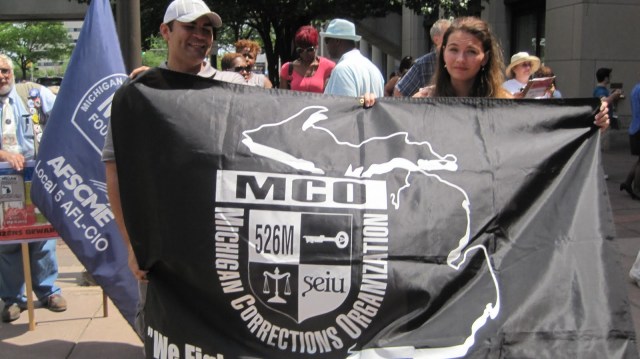Lapeer, Mich.–On Dec. 1, Aramark Correctional Services will begin running Food Service for the Michigan Department of Corrections (MDOC), creating another sector of low-wage workers in Michigan. Instead of rewarding MDOC Food Service employees for their years of loyal service, the state of Michigan took away their decent-paying jobs with benefits and gave them the choice of quitting or working for Aramark at the poverty wage of $10 per hour. In a state struggling with a high unemployment rate and flooded with low-wage dead-end jobs, 60,000 in the fast-food sector in the metro Detroit area alone, why would the state government choose to add to these statistics?
Michigan’s ill-advised MDOC privatization includes Corizon Inc. (Health Service), Keefe Commissary Network (Prisoner Store) and, now, Aramark (Food Service). They are middlemen with their hands in taxpayers’ pockets, the pockets of their employees, prisoners and their families. They offer little or nothing in return for the millions of dollars they skim, except bribes disguised as campaign donations and the occasional kickbacks in return for contracts. Not one of them is a Michigan-based business.
Corizon formerly was Correctional Medical Services Inc. (CMS), whose failure to provide adequate healthcare to Michigan prisoners was exposed in August 2006. Then-governor Jennifer Granholm had to conduct an independent review, which resulted in CMS’s replacement by Prison Health Services Inc. (PHS). CMS then just merged with PHS, changing its name to Corizon. Keefe is infamous for taking over prisoner stores and price gouging. Aramark has a well-documented history of so underbidding DOC contracts that they have to cut prisoner meals down to a near bread and water diet in order to turn a profit. See David M. Reutter, “Aramark Discontinues, Loses Food Service Contracts,” Prison Legal News(PLN), Oct. 2009, pp. 36-37.
Aramark’s plan, in part, relies on prisoners feeding themselves by buying the egregiously overpriced garbage sold in prisoner stores operated by Keefe’s kickback and bribery specialists. See David M. Reutter, “Florida DOC and Keefe Gouge Prisoners on Commissary Sales,” PLN, Oct. 2009, p. 25; and “Florida: Two Men Sentenced in Prison Canteen Kickback Scheme,” PLN, Oct. 2012, p. 40.
For a private corporation to take over a publicly funded operation in Michigan, such as MDOC Food Service, there has to be a saving for the state. MDOC Food Service’s reportedly feeds prisoners at a cost of $1.65 per day, an unbelievably low figure, unless one has eaten the food, as I have.
Incredibly, Aramark claims it can feed prisoners for even less, yet they needed $2.76 per prisoner per day to feed Oakland County Jail prisoners in 2011 according to Undersheriff Michael McCabe. See Chris Christoff, “What Snyder may try to cut,” The Detroit Free Press, 1/16/11, 5A.
The harm inflicted by Aramark will be almost immediate. Aramark is advertising for food service employees at $10 per hour–a poverty wage that will increase the smuggling of tobacco and drugs into Michigan’s prisons, resulting in further loss of control in prisons where control is already critical. It’s well documented that corrections employees are responsible for over 90% of contraband smuggled into prison and underpaying them serves to incentivize their smuggling.
The atrociously inadequate healthcare provided by Corizon might take more time to manifest. Diagnosed colorectal, prostate and skin cancers remain untreated for years, diagnosed hernias will remain intentionally untreated, with patients’ intestines protruding through their abdominal walls, until they strangulate, while pain management is nonexistent, etc. Corizon’s business model is to provide little or no healthcare until sued, and then offer lowball settlements to prisoners or deceased prisoners’ estates. In Corizon’s eyes prisoners’ lives aren’t worth very much, and certainly not worth adversely affecting their bottom line. Eventually, Corizon will bail out with their bank accounts swollen at state taxpayers’ expense, as will Aramark and Keefe, and the taxpayers will end up footing the bill for an aged and poorly cared for prisoner population.
–Rand Gould

